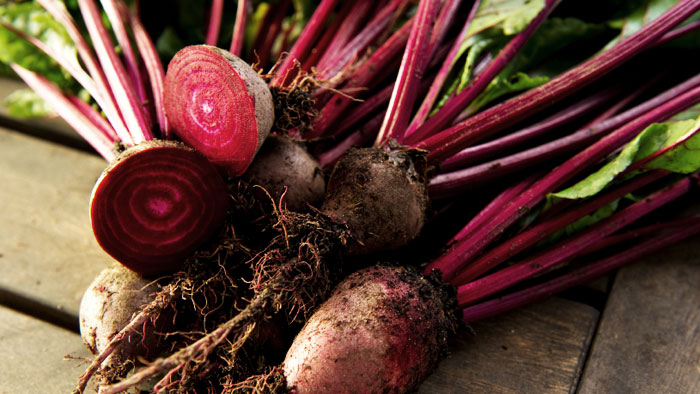We all know a healthy diet is high in vegetables and that athletes generally have healthier eating habits than the average person. Despite this, it wasn’t until 2009 that the performance benefits of beet juice (known as beetroot juice outside of North America) came to the attention of athletes1. Since then, elite athletes have fully invested in beets as a way to gain the last couple percent over their competition. Five years after the first research was published we have a greater understanding of how and why beets boost performance and how we can get the greatest benefit possible. This is a guide to optimizing your beet intake.
The science
Beets contain a large amount of inorganic nitrates. These compounds are the precursor to a very important signalling molecule that our body needs to function- Nitric Oxide2. NO is made naturally within our bodies but we can dramatically increase its availability by eating nitrate rich food. Among other roles, NO acts as a vasodilator in functioning skeletal muscle, increasing the size of blood vessels to allow more oxygen flow3.
Juice, concentrate, or powder?
The first study on beets suggested that 500 mL of beet juice each day may lead to a 15% increase in the time taken to reach exhaustion1. Since then, athletes have tried numerous ways to make this process more convenient. Juicing 3 to 5 beets every morning is not only time consuming and messy, but also expensive and impractical if you are traveling. Alternatives in the form of powder and concentrated juices are now widely available on the market. The most recent study at the University of Exeter used concentrated beet juice, like Red Ace Organics, which replicated the effect of fresh juice4. Research has yet to recreate the performance benefits using beet powder.
How much?
While the first study used 500 mL, or about 2 cups, that is a lot of beet juice to drink. Anecdotes of digestive distress after drinking that quantity suggest there is an advantage in finding the lowest dose that works for you. New data shows improvements can be measured at 300 mL, or about one shot of concentrated beet juice4. At 600 mL the performance gain is bigger, but doubling that dose provides no extra benefit. This suggests that NO levels can become saturated.
Raw or cooked?
Previous research suggests that cooking will significantly reduce the available nitrates in vegetables5. This is why juicing beets or using concentrate is the preferred method for ingesting beets. The exception to this is light steaming, which may actually make the nutrients more available to the body6. Obviously, beets take some serious cooking to be edible, steaming isn’t going to cut it. For other high nitrate vegetables, like spinach, light steaming will not affect the nitrate availability.
Drink it fast or take it slow?
The nitrates in beets are converted into nitrites by friendly bacteria in our saliva7. This is an important step that should not be overlooked. This conversion is not instantaneous, and the use of mouthwash or toothpaste soon after drinking beet juice may wash the nitrates out of your saliva7. It follows that drinking beet juice slowly may increase the time nitrates are in contact with these bacteria, increasing the conversion to nitrites.
Will it work for me?
Like all supplements, individuals will respond differently to the performance enhancing benefits of beet juice. In the latest University of Exeter study, they report “nonresponders” in each group4. There was a chance that no performance benefit would be seen, even at the highest dose given. The subjects being tested in scientific research are in a tightly controlled environment; in the real world it’s impossible to tell how other supplements, or even caffeine, may interact with NO levels.
Just beets?
Beets have taken the limelight in the battle for nitrate supremacy, but the truth is many vegetables contain inorganic nitrates in high amounts9. Keeping your nitrates high in your normal diet may maximise the effect; use beet juice to top it up before a major competition. The following table shows the nitrate content of other common vegetables.
Summary
Beets are not going to make you fast on their own, but for the athlete that cares about marginal gains, they could provide the race winning boost. New products such as concentrated beet shots now make it convenient to consume on race day, and it’s ideal to do so 2-3 hours before the gun goes off. Experiment in your own training to see what works for you.


